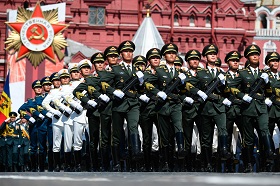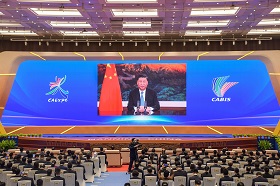Two months after the inauguration of Present Joe Biden, with the political dust in Washington settling down, it is becoming increasingly clear that the US Democratic administration policy toward Russia and China contains more elements of continuity than elements of change. Unfortunately, this continuity is not something that they would like to observe in Moscow and Beijing.
With the change of guard in the White House the rules of the game on the Great Eurasian Chessboard have not changed a bit. The Biden administration, like the Trump administration before it, continues to push the world toward a new bipolarity. It should not be surprising, therefore, that Russian Foreign Minister Sergey Lavrov rushed to Guilin to meet his Chinese counterpart Wang Yi, marking his first visit to the country since the coronavirus outbreak.
Neither in Moscow nor in Beijing do they harbor illusions about opportunities to fix their problems with Washington anytime soon; the two foreign ministers are going to hammer out a new, enhanced model of the bilateral strategic partnership for years to come. Though a common interest in responding to the growing US pressure is definitely not the only driver for closer economic, political and military ties between Russia and China, the US factor is an important additional incentive for making these ties more diverse and intensive.
After China, Foreign Minister Lavrov is making an extended stop in South Korea. True, ROK is a US ally and it regards America as its prime security provider. Still, Seoul has special relations with Beijing and Moscow; these special relations are ones the ROK is not ready to give up. The ROK-China economic relations remain critical for the South Korea prosperity. The South Korean approach to North Korea is not a carbon copy of the US or Japanese positions. It is clear that the South Korean leadership is not ready to automatically subscribe to any new anti-Russian or anti-Chinese policies from Washington.
At the end of the day, the outcome of the Great Game on the Global Chessboard will depend on whether there are regional players bold enough to question the archaic bipolar thinking emanating from Washington today. The outcome of Lavrov's trip to Seoul might be an interesting case to watch.
Two months after the inauguration of Present Joe Biden, with the political dust in Washington settling down, it is becoming increasingly clear that the US Democratic administration policy toward Russia and China contains more elements of continuity than elements of change. Unfortunately, this continuity is not something that they would like to observe in Moscow and Beijing.
If someone has hoped that a swift and unconditional extension of the New START agreement might trigger a renewed US-Russian dialogue on strategic stability and arms control, these hopes have gone up in smoke after the US president labeled his Russia peer as a "killer." Biden also unequivocally rejected the idea of security debates offered by President Vladimir Putin. Before the US-Chinese "2+2" meeting in Anchorage, Alaska, there could have been expectations of at least a limited détente between Washington and Beijing. But now after this very tense and not quite productive meeting, such expectations have just evaporated into thin air.
One can only guess why the Biden team opted to continue the "dual containment" approach of its predecessors toward the main US geopolitical opponents with such a relentless zeal and vigor. Maybe in the White House they decided that any shade of US flexibility would be interpreted in Moscow and in Beijing as a sign of an American weakness, and as an invitation to seek more concessions from the administration. Maybe Biden is concerned about potential criticism that a more flexible approach could generate powerful Republican reactions from neo-cons on the Hill and from a defeated, but not yet completely politically destroyed, Donald Trump. Maybe, by pursuing this tough line, the new administration intends to demonstrate to the US public and the American allies and partners abroad its unbreakable commitment to human rights and democracy promotion agenda.
In any case, with the change of guard in the White House the rules of the game on the Great Eurasian Chessboard have not changed a bit. The Biden administration, like the Trump administration before it, continues to push the world toward a new bipolarity. It should not be surprising, therefore, that Russian Foreign Minister Sergey Lavrov rushed to Guilin to meet his Chinese counterpart Wang Yi, marking his first visit to the country since the coronavirus outbreak.
The formal goal of the trip is to discuss the 20-year anniversary of the Treaty of Good-Neighborliness and Friendly Cooperation between the People's Republic of China and the Russian Federation signed in July of 2001. The treaty has indeed been a remarkable accomplishment of the two sides. But the ongoing conversation between Lavrov and Wang is not limited to expressions of mutual admiration; it focuses mostly on how Moscow and Beijing could work hand in hand with each other responding to the US assertiveness. There are many ways to do that—ranging from solidarity voting in international organizations to coordinating national information strategies, to working with like-minded countries across the globe and to exchanging best practices in preventing the US interference into Russia's and China's domestic affairs respectively.
Neither in Moscow nor in Beijing do they harbor illusions about opportunities to fix their problems with Washington anytime soon; the two foreign ministers are going to hammer out a new, enhanced model of the bilateral strategic partnership for years to come. Though a common interest in responding to the growing US pressure is definitely not the only driver for closer economic, political and military ties between Russia and China, the US factor is an important additional incentive for making these ties more diverse and intensive.
After China, Foreign Minister Lavrov is making an extended stop in South Korea. Here, again, the Russian minister can find plenty of issues to discuss with his hosts that have little or nothing to do with the US. After all, we are approaching 30 years since diplomatic relations between Moscow and Seoul were established—a remarkable jubilee and a nice opportunity to reflect on the next 30 years!
However, under the circumstances, Lavrov will undoubtedly try to test the limits of the ROK's "strategic autonomy" from Washington. True, ROK is a US ally and it regards America as its prime security provider. Still, Seoul has special relations with Beijing and Moscow; these special relations are ones the ROK is not ready to give up. The ROK-China economic relations remain critical for the South Korea prosperity. The South Korean approach to North Korea is not a carbon copy of the US or Japanese positions. It is clear that the South Korean leadership is not ready to automatically subscribe to any new anti-Russian or anti-Chinese policies from Washington.
At the end of the day, the outcome of the Great Game on the Global Chessboard will depend on whether there are regional players bold enough to question the archaic bipolar thinking emanating from Washington today. The outcome of Lavrov's trip to Seoul might be an interesting case to watch.
First published in the Global Times.






